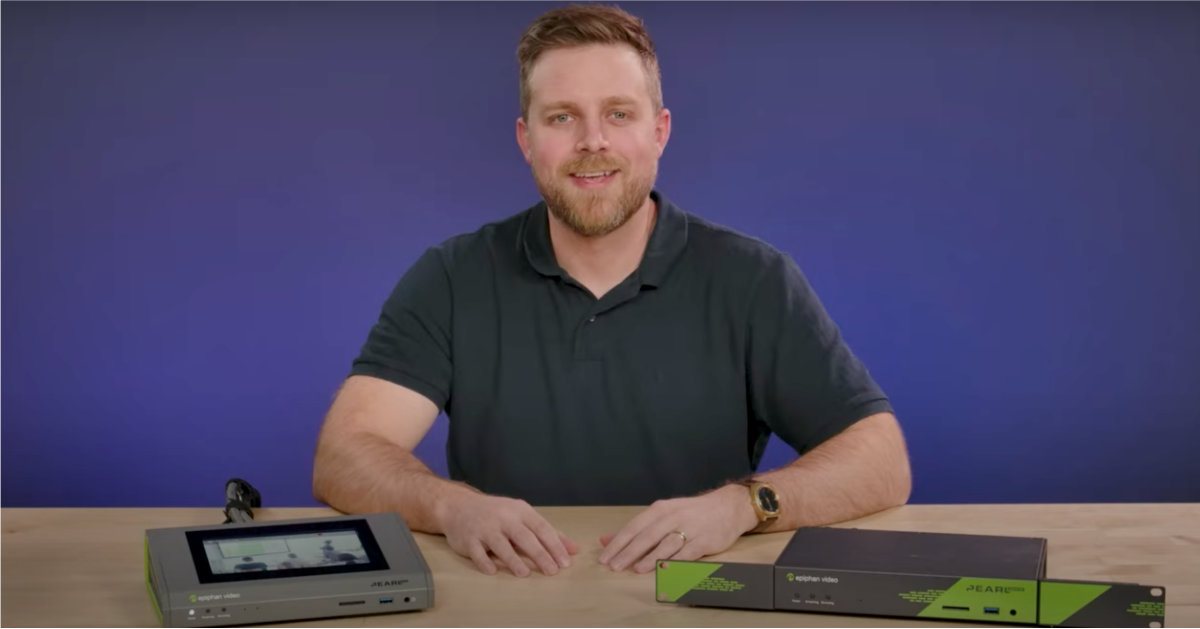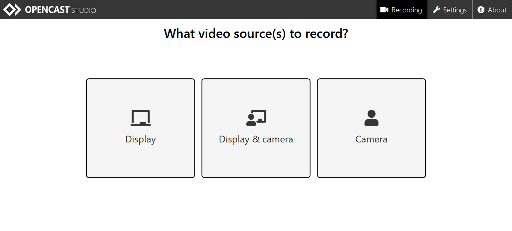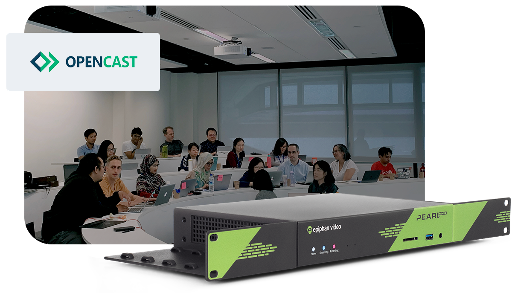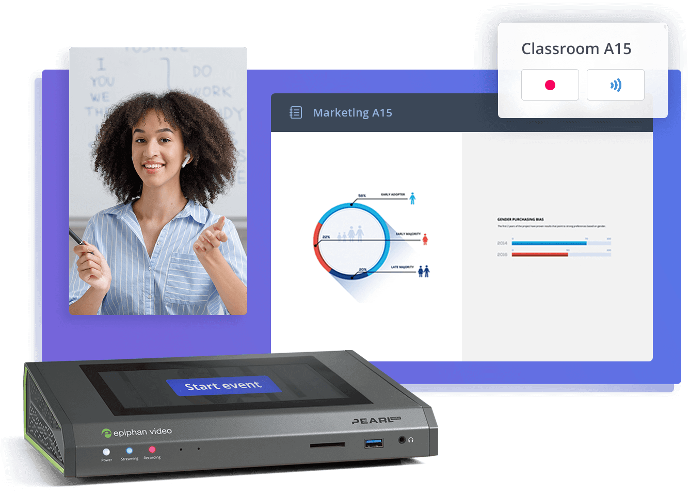
Institutions constantly seek innovative solutions in digital education and media management. Video content must be managed, recorded, and distributed efficiently.
Opencast is a tool designed to streamline these processes for educational institutions and organisations.
It is a flexible, reliable, and scalable open-source video management system for academic institutions. It was built by a community of developers from leading universities and organisations worldwide.
The Opencast platform helps educators and administrators record and manage video content.
This blog will provide an overview of Opencast, its integration with video production hardware, and frequently asked questions about the platform.
Streamline your Opencast video workflows with Epiphan Pearl
Epiphan Pearl is a reliable hardware capture agent that integrates seamlessly with Opencast. Harness the power of this integration to enhance efficiency and flexibility in lecture recording.
Opencast is a free, open-source video management system made for educational institutions. It allows users to schedule, record, edit, and distribute video and audio content. It offers tools for managing digital media, from lecture capture in universities to video management in organisations.
What does Opencast do?
Opencast caters to several critical needs in video management:
· Scheduled Recording: Enables institutions to automate the recording of lectures and events.
· Live Streaming: Enables the live broadcast of events or lectures, making content accessible in real-time.
· Video Editing and Processing: Offers tools for editing, processing, and enhancing video content post-recording.
· Content Distribution: Facilitates the distribution of content through various channels, ensuring accessibility for the intended audience.
Who uses Opencast?
AV administrators and developers in higher education institutions primarily use Opencast. Its robust set of tools caters to the complex needs of universities and colleges that regularly produce and manage a large volume of video content.
Additionally, its open-source and flexible design makes it appealing to organisations beyond academia looking for a video content management system.
Who might benefit from Opencast?
Opencast could benefit any institution or organisation looking to manage video content more efficiently. It is particularly beneficial for educational institutions aiming to enhance their e-learning platforms with high-quality video content.
Screenshot of the administrative interface of Opencast
Common questions about Opencast
- Is Opencast difficult to implement and use?
Opencast is designed with scalability and ease of use in mind. While the initial setup might require some technical expertise, especially to customise it to specific needs, its user interface is intuitive for day-to-day operations. The open-source community around Opencast also provides extensive documentation and support. - How is Opencast different from other video management solutions?
Opencast’s open-source nature is its most significant differentiator. This means it’s not only free to use but also highly customisable. Institutions can adapt it to their unique needs without the licensing and cost constraints associated with proprietary software. Moreover, it’s specifically designed for educational environments, making it a tailored solution for academic video management. - How often does Opencast get updated?
The platform operates on a schedule that rolls out two major updates every year, along with various smaller updates for bug fixes and maintenance in between. Typically, these major updates are launched once in June and once in December. A detailed schedule for these releases is often shared about six months in advance of each major update. - How does video capture work in Opencast?
Opencast employs a concept known as “capture agents” to record video content. These tools, which can be software or hardware, connect to cameras or desktops to record audio and video. Once captured, the content is processed and managed through the Opencast platform.

Screenshot of the source selection in Opencast Studio
Integrating recording hardware
While Opencast can work with various recording hardware and software, finding the right fit is crucial for capturing high-quality video content and ensuring smooth operations. In this context, Epiphan Pearl encoders are a compelling choice for several reasons.
Pearl encoders offer unparalleled versatility with support for multiple video inputs (HDMI, SDI, USB, IP) and audio inputs (digital embedded, IP, USB, analogue). This means they can adapt to various recording environments and setups, from lecture halls to seminar rooms. Additionally, their resilience to network failures – with features like recording schedules offline and uploading when a connection is restored – ensures that no content is lost due to technical issues.

From an administrative perspective, Pearl encoders simplify the video capture process. AV administrators can monitor the encoders from the Opencast Admin interface, overseeing recording schedules and device status remotely. Scheduled recording capabilities ensure lecture and event capture without manual intervention, directly aligning with Opencast’s automation ethos.
Pearl is a great option for institutions seeking a comprehensive AV solution. It offers a cloud-based control portal for managing fleets called Epiphan Edge and an API for integrating with in-room control systems. With models ranging from 1 to 6 channels and supporting HD to 4K, Pearl encoders cater to institutions of all sizes and technical requirements.
What cameras are a workable companion?
APT AV cameras are a perfect companion to Epiphan Pearl in an Opencast system. They have a range of specially designed cameras for education.
Ease of use and reliability are essential to developing a seamless student experience. The education camera solution needs to be easy to operate by faculty members, allowing them to focus on the lesson, lecture, or event at hand rather than worrying about disruptions or dropouts.
The cameras feature high-performance subject auto-tracking, excellent picture quality, and more. Explore the range of APT AV high-performance cameras ideal for educational institutions.
HD100T Education Intelligent Auto Tracking Camera
The HD100T is a fully featured, high-performance pan tilt zoom (PTZ) camera designed for educational settings. Featuring advanced auto-tracking pan tilt zoom (PTZ), an integrated ultra-wide panoramic camera and Full HD output resolution, the HD100T is built to capture hybrid and online learning content.
A choice of zoom lens magnifications, and HDMI, NDI, and LAN connectivity make the HD100T suitable for all configurations.
The HD100T is ideal for live streaming, recording, lecture capture, school event streaming, hybrid classrooms, and distance education.
HD220 Lecturer Auto Tracking Electronic Pan Tilt Zoom (ePTZ) Camera
Driven by world-leading technology and high-quality components, the HD220 is an easy-to-configure, affordable lecture camera that delivers accurate and natural auto-tracking. It incorporates an ultra-wide lens and advanced 4K CMOS image sensor to deliver Full HD video output. The 3x digital zoom magnification is available while retaining excellent image sharpness. SDI, USB 3.0 and LAN connectivity make the HD220 suitable for a wide range of applications and can be counted on to deliver exceptional image quality and robust reliability.
The HD220 is ideal for lecture capture, school event streaming, hybrid classrooms, and distance education.

Equip your campus with best-in-class video solutions.
Meet your educational institution’s video production needs with a line of flexible and scalable hardware for video capture, streaming, and recording—all centrally managed. This hardware is perfect for lecture capture, online learning programs, and more.
EXPLORE EPIPHAN
Conclusion
Opencast stands out as a powerful, open-source video management platform specially tailored for the needs of educational institutions and organisations looking to manage video content efficiently. Its compatibility with versatile and reliable recording hardware like Epiphan Pearl encoders further enhances its appeal by ensuring high-quality video capture and management.
This provides a straightforward, effective way to create and share high-quality videos, making life easier for both educators and organisations. Together, they ensure a smooth video management process, supporting better learning and wider content distribution with less hassle.
*This blog is extracted from Epiphan.
About Epiphan Video
Epiphan Video provides award-winning, purpose-built hardware solutions that help your business create impactful video content.
The Epiphan Pearl range of hardware encoders is the ultimate system for maximum versatility with multi-encoding, multi-streaming, recording, custom layouts, switching, and more. It is ideal for live event production, enterprise communication or lecture capture in higher education.
APTECH is the authorised Australian distributor of Epiphan Video products. Every Epiphan solution from APTECH is backed by local warranty and support.